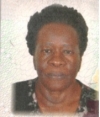Jonathan Izudi
ID: UNCST-2019-R000469
|
Effectiveness of Multi-Month Dispensing of Anti-Tuberculosis Drugs (MULTI-DAT) Versus Standard of Care on Treatment Success Rate Among People with Drug Susceptible Tuberculosis in Rural Eastern Uganda
REFNo: HS3953ES
To evaluate the effectiveness of MULTI-DAT on cure and treatment success rates at 6 months of treatment compared to the standard of care (SOC) using an open-label, individually randomized controlled trial or RCT (Aim 2). ,To explore stakeholder perceptions regarding the relevance and appropriateness of MULTI-DAT, including the delivery of MULTI-DAT among people with drug-susceptible PTB aged ≥15 years using a qualitative study (Aim 1).,Overall, the MORAD study will focus on the practicability and effectiveness of MULTI-DAT among people with drug-susceptible pulmonary TB (PTB) aged ≥15 years on the standard 6-month anti-TB treatment regimen in eastern Uganda,
|
Uganda |
2024-03-27 18:52:57 |
2027-03-27 |
Medical and Health Sciences |
Clinical Trial |
Non-degree Award |
.jpg)
|
KABAGAMBE DAVID JESSE
ID: UNCST-2023-R005585
|
FINANCIAL INCLUSSION AND MICRO, SMALL AND MEDIUM ENTERPRISES (MSME’S) FINANCIAL PERFORMANCE IN UGANDA; A CASE OF AGRIBUSINESS ENTERPRISES IN SELECTED DISTRICTS IN KIGEZI SUB-REGION
REFNo: SS2409ES
1. To determine the effect of Access to finance services on the financial performance of micro, small and medium enterprises (MSME’s) in Uganda
2. To model the effect of Usage of Financial services on the financial performance of micro, small and medium enterprises (MSME’s) in Uganda
3. To assess the effect of Quality of Financial services on the financial performance of micro, small and medium enterprises (MSME’s) in Uganda
4. To identify the costs associated with financial inclusion on the financial performance of micro, small and medium enterprises (MSME’s) in Uganda
5. To draw conclusions and policy recommendations regarding financial inclusiveness financial performance of micro, small and medium enterprises (MSME’s) in Uganda
|
Uganda |
2024-03-27 18:41:45 |
2027-03-27 |
Social Science and Humanities |
Non-Clinical Trial |
Degree Award |

|
Eva Smallegange Sophia
ID: UNCST-2023-R005788
|
Feasibility trial for the PlayMatters program in refugee settlements in Uganda: a teacher professional development program aiming to improve teacher practices, child holistic outcomes and wellbeing by integrating Learning-through-Play as a pedagogical approach in schools
REFNo: SS2376ES
To assess the feasibility (from the perspective of the multi-language barrier ) of studying child-level outcomes as a primary question of the impact trial.,To assess the feasibility of cluster randomization trial procedures to limit biases and risk of contamination,To evaluate the fidelity of intervention delivery by PlayMatters trained implementers at each of the cascade levels of the intervention (master trainers, tutors and teachers),To evaluate the acceptability of the PlayMatters intervention in refugee settlements and host communities in Uganda ( Adjumani, Yumbe and Lamwo),
|
Netherlands |
2024-03-27 18:36:45 |
2027-03-27 |
Social Science and Humanities |
Non-Clinical Trial |
Non-degree Award |

|
Kirabo Suubi
ID: UNCST-2023-R005659
|
Pre-post intervention study to assess the implementation of SAFE program as well as its effectiveness in improving the prevention of, and response to child sexual abuse and exploitation in Western Uganda.
REFNo: SS2506ES
The goal of this evaluation is to assess the process and effectiveness of the SAFE intervention in improving the prevention and response to child sexual abuse and exploitation in Western Uganda. The following are the specific objectives of the study.
Baseline
1. Assess pre--intervention knowledge, perceptions, attitudes, agency, and intentions/behaviors related to mitigating risk exposure to child sexual abuse and exploitation: including reporting and help-seeking in 10 SAFE Model pilot intervention and 4 control schools.
At endline, the study intends to:
2. Assess post -intervention knowledge, perceptions, attitudes, agency, and intentions/behaviors related to mitigating risk exposure to child sexual abuse and exploitation: including reporting and help-seeking in 10 SAFE Model pilot intervention and 4 control schools.
3. To examine the extent to which the activities are implemented according to the SAFE model.
4. Assess the extent to which SAFE intervention is relevant to addressing the CSA problem.
5. Assess whether the SAFE model is contextually sustainable.
|
Uganda |
2024-03-27 18:30:26 |
2027-03-27 |
Social Science and Humanities |
Non-Clinical Trial |
Non-degree Award |
.jpg)
|
Damalie Nalwanga
ID: UNCST-2021-R013217
|
Understanding, knowledge and attitudes of caregivers about the impact of HIV on the development and behavior of children of school-going-age
REFNo: HS3884ES
3. What are the caregivers’ attitudes about the impact of HIV on the development and behavior of children of school-going-age,2. What do caregivers know about the impact of HIV on the development and behavior of children of school-going-age,1. What is the caregivers’ understanding of the impact of HIV on the development and behavior of children of school-going-age,To explore caregivers’ understanding, knowledge and attitudes about the impact of HIV on the development and behavior of children of school-going-age,
|
Uganda |
2024-03-27 18:22:42 |
2027-03-27 |
Medical and Health Sciences |
Non-Clinical Trial |
Non-degree Award |

|
Edgar Mulogo Mugema
ID: UNCST-2023-R008170
|
Artemisinin Resistance in Africa: its emergence and evolution in Rwanda and surrounding countries
REFNo: HS3549ES
• 1A will map the regional distribution and define the origins of 561H in Rwanda and neighboring regions in other countries. • 1B will define regional parasite population structure and migration routes that will impact the spread of 561H. • 1C will derive estimates of the selection coefficient for 561H and characterise associated community and infection-related (e.g. polyclonality, known partner drug resistance mutations, within-host relatedness) risk factors.,
|
Uganda |
2024-03-27 13:58:48 |
2027-03-27 |
Medical and Health Sciences |
Non-Clinical Trial |
Non-degree Award |

|
Clemensia Nakabiito
ID: UNCST-2022-R011396
|
Viiv Protocol 221163: Long-Term Follow-Up of CAB LA for Participants in HPTN 083 and HPTN 084 CAB PrEP Studies at Risk of HIV Acquisition.
REFNo: HS3752ES
Primary Objectives
To describe new HIV infections in adult and adolescent participants at risk of HIV acquisition included in the HPTN 083 and HPTN 084 studies and their associated sub-studies.
Secondary Objectives
To describe any serious adverse events (SAEs), Grade 3 and Grade 4 ISRs and AEs leading to withdrawal in adult and adolescent participants included in the HPTN 083 and HPTN 084 studies and their associated sub-studies.
|
Uganda |
2024-03-26 18:05:15 |
2027-03-26 |
Medical and Health Sciences |
Non-Clinical Trial |
Non-degree Award |

|
Gertrude Nanyonjo Gawaya
ID: UNCST-2022-R005857
|
Understanding end-user preferences and determining relative product positioning of new and emerging HIV prevention products (LAI-PrEP, bNAbs and HIV vaccines): Development and implementation of a Discrete Choice Experiment among at-risk populations in India and Uganda to inform product development and delivery
REFNo: SS2333ES
Objective 1: To explore and understand end-user preferences for HIV prevention options to design elicitation research (designing DCE)
To identify key attributes (product and delivery site characteristics), and levels (options within a characteristic) through community key stakeholder consultations.
To validate the product attributes and levels in consultation with representatives of potential end-users, non-governmental organisations (NGOs) and community-based organisations (CBOs), and government officials/policymakers for designing preference elicitation research.
Objective 2: To identify end-user preferences for HIV prevention options through elicitation research (DCE implementation)
To quantify the strength of participants’ preferences.
To determine the relative product positioning.
Objective 3: To understand decision-making process involved in choice of products among DCE participants
|
Uganda |
2024-03-26 17:26:24 |
2027-03-26 |
Social Science and Humanities |
Non-Clinical Trial |
Non-degree Award |

|
Proscovia Ntakyo Renzaho
ID:
|
Evaluation of sustainable intensification models for food and nutrition security of small holder households in southwestern highlands of Uganda
REFNo: SS1886ES
3. To understand the interaction effects between livestock and crop intensification on crop productivity in south western highland in Uganda4. To assess the effects of interrelated interventions in crop -livestock production on household food and nutrition security
|
Uganda |
2024-03-26 16:18:44 |
2027-03-26 |
Social Science and Humanities |
Non-Clinical Trial |
Non-degree Award |

|
Dr. Gad Ndaruhutse Ruzaaza
ID: UNCST-2023-R006987
|
Perceptions of a point-of-use water filtration device among individuals of the Kashongi Community
REFNo: HS3490ES
to explore their perceptions of a point-of-use filtration device made using plant matter for filtration,to explore participants’ perceptions of the impact of water quality on their quality of life and the impact of water on their and their family’s health. ,
|
Uganda |
2024-03-26 15:36:54 |
2027-03-26 |
Medical and Health Sciences |
Non-Clinical Trial |
Non-degree Award |

|
Terence Odoch
ID: UNCST-2022-R010584
|
eRabies – on the way to rabies elimination in Uganda: pilot mixed studies in Kampala, Kyegegwa and Soroti
REFNo: HS3463ES
a) To determine the benefits and potential barriers to the use of using an integrated One Health rabies surveillance form in Kampala, Kyegegwa and Soroti districts in Uganda.
b) To determine the feasibility of implementing an integrated One Health rabies surveillance form in Kampala, Kyegegwa and Soroti districts in Uganda.
c) To investigate the effectiveness of tailored community educational materials on enhancing knowledge and reduction of number of dog bites in Kampala, Kyegegwa and Soroti districts in Uganda.
d) To determine barriers to and enablers of responsible dog ownership and canine rabies elimination in Kampala, Kyegegwa and Soroti districts in Uganda.
e) To test the applicability of static point, school-based, mixed campaign with livestock health activities and mixed campaigns with human health activities rabies vaccination strategies in Kampala, Kyegegwa and Soroti districts in Uganda.
f) To determine the influence of static point, school-based, mixed campaign with livestock health activities and mixed campaigns with human health activities rabies vaccination strategies on vaccination coverage in Kampala, Kyegegwa and Soroti districts in Uganda.
g) Evaluate the effectiveness of the eRabies project interventions towards realising canine rabies elimination.
h) To assess costs of the different components of the eRabies project and the cost-effectiveness of different Post-Exposure Prophylaxis (PEP) scenarios.
|
Uganda |
2024-03-26 15:30:41 |
2027-03-26 |
Medical and Health Sciences |
Non-Clinical Trial |
Non-degree Award |

|
GRACE KANSIIME
ID: UNCST-2019-R000380
|
COMPREHENSIVE APPROACH TO HYPERTENSION IMPROVEMENT IN RURAL UGANDA (CHIRU)
REFNo: HS3770ES
1: To determine the prevalence of hypertension among community residents in a rural population
2: To assess hypertension knowledge among adults in rural south-western Uganda
3: To assess healthcare providers’ knowledge regarding hypertension management in rural southwestern Uganda
4: To evaluate whether an evidence-based multicomponent intervention to manage hypertension can be implemented in rural Uganda.
|
Uganda |
2024-03-25 12:44:13 |
2027-03-25 |
Medical and Health Sciences |
Non-Clinical Trial |
Non-degree Award |

|
JULIET MWANGA-AMUMPAIRE
ID: UNCST-2022-R009420
|
Catalyzing Artificial intelligence for Pediatric Tuberculosis Research (CAPTURE) Consortium in a project aimed at developing a chest X-ray (CXR) artificial intelligence (AI) algorithm for intrathoracic
REFNo: HS3921ES
The overall goal is to develop a CXR AI algorithm for intrathoracic TB that can be used for triage and/or diagnosis in children less than 15 years. ,
|
Uganda |
2024-03-25 12:38:18 |
2027-03-25 |
Medical and Health Sciences |
Non-Clinical Trial |
Non-degree Award |

|
Noella Okalany Akwi Regina
ID: UNCST-2022-R011085
|
Preterm Postnatal Growth (PPG) : A retrospective study of postnatal growth in preterm very low birthweight neonates in Eastern Uganda.
REFNo: HS3295ES
1. To assess the postnatal growth of VLBW infants from birth until discharge.
2. To relate growth velocity to birth weight, nutritional practices, illnesses.
3. To determine what proportion of preterm infants had not regained their birth weight by day 28 of life.
4. To determine the association between neonatal feeding regimens and morbidity/ mortality
|
Uganda |
2024-03-20 16:29:31 |
2027-03-20 |
Medical and Health Sciences |
Non-Clinical Trial |
Non-degree Award |

|
Phoebe Batchelor Lois
ID:
|
Effective strategies for sustainable fisheries management in Lake Victoria in Uganda.
REFNo: A408ES
1. How do local fishing communities and stakeholders perceive fisheries management initiatives?
2. How have environmental, socio-economic and political factors impacted the success of management initiatives?
3. Using primary data and comparing it to the literature, how could fisheries management initiatives be improved and adapted to the present day
|
UK |
2024-03-20 16:27:19 |
2027-03-20 |
Agricultural Sciences |
Non-Clinical Trial |
Degree Award |

|
Priscille Kankindi
ID: UNCST-2023-R005708
|
The Culture of Masculinity and Wellbeing of Women in Luweero District, Uganda
REFNo: SS2469ES
To measure the mediating effect of Human Rights Instruments on the relationship between culture of masculinity and wellbeing of women in Luwero, Disitrct, Uganda,To evaluate the relationship between physical support and well-being of women in Luwero District, Uganda.,To examine the influence of economic support on the well-being of women in Luwero District, Uganda.,To assess the relationship between emotional support and well-being of women in Luwero District, Uganda.,The main objective of the study is to examine the relationship between the culture of masculinity and well-being of women in Luwero District.,
|
Rwanda |
2024-03-20 16:24:57 |
2027-03-20 |
Social Science and Humanities |
Non-Clinical Trial |
Degree Award |

|
Collins Ankunda
ID:
|
Assessing the Treatment Outcomes of Antiretroviral Therapy Among Various Demographic Groups at Mildmay Hospital, Uganda: A Retrospective Cohort Study (TREATED).
REFNo: HS3873ES
1.To assess the Treatment Outcomes among Pregnant Women Receiving Antiretroviral Therapy at MHUg.
2.To assess the HIV Mutations & Outcomes among HIV infected individuals on Genotypically Guided ART Prescription at MHUg.
3. To evaluate the Treatment Outcomes among TB Patients with HIV Co-infection at MHUg.
4.To investigate the Treatment Outcomes among Adolescents and Children on Antiretroviral Therapy at MHUg.
|
Uganda |
2024-03-20 16:22:04 |
2027-03-20 |
Medical and Health Sciences |
Non-Clinical Trial |
Degree Award |

|
Stephen Ojiambo Wandera
ID: UNCST-2021-R012147
|
FAMILEA: The Remaking of the Family in East Africa
REFNo: SS2417ES
1.4.1 General objective
The FamilEA study in Kampala, Uganda, is part of a larger study that aims to map out the shifting family landscape of residents of East Africa (using Nairobi, Kenya and Kampala, Uganda as starting points), including family networks based outside the city, which is termed the family archipelago. Two main research questions will structure our empirical inquiry. First, how are parental and conjugal ties, as well as extended kinship ties, reinvented and adapted to the realities of urban life and socioeconomic change (single parenthood, links to kin in the village, relations with siblings, etc.), and are there vulnerabilities associated with such family changes? Second, do kinship ties necessarily encompass all family practices; which other ties appear in family-like configurations, and which evolving solidarity networks do academics and policymakers fail to give due consideration to?
1.4.2 Specific objectives
To answer questions in our main objective, we set up three specific objectives that correspond to disciplinary-empirical entry points:
1. To identify and categorize the diverse ways of doing families for active-age residents in Kampala Metropolitan through everyday practices/events in different types of ties/configurations, and related vulnerabilities.
2. To explore Ugandan family archipelagos, i.e., familyhood’s spatial and mobility dimensions, in urban zones as well as across various family islands up-country and how they relate to each other.
3. To employ a historical perspective to assess changes and the newness of contemporary family arrangements in Uganda.
|
Uganda |
2024-03-20 16:21:02 |
2027-03-20 |
Social Science and Humanities |
Non-Clinical Trial |
Non-degree Award |

|
Hasifah Namatovu Kasujja
ID:
|
ICT INNOVATIONS AND GAP ANALYSIS
REFNo: SIR302ES
1. To conduct a stakeholder analysis in Uganda’s ICT innovation ecosystem, their contributions to the various stages of the innovation process and the challenges faced.
2. To assess Uganda’s innovation maturity and create a roadmap for future improvement.
3. To develop a system to manage innovator data
4. To enhance efficiency through improving operational processes and the implementation of technology solutions.
|
Uganda |
2024-03-20 16:18:06 |
2027-03-20 |
Engineering and Technology |
Non-Clinical Trial |
Non-degree Award |

|
Margaret Kabahenda
ID:
|
Empowering preschool teachers to integrate nutrition education in their routine teaching to advance child health.
REFNo: HS3908ES
1. Characterize the available nutrition education and physical activity training programs for preschool teachers;
2. Determine the barriers and supports for integrating nutrition education in preschool curricula;
3. Establish the levels of variations in dietary practices and nutritional status among preschool children from schools of difference socioeconomic domains (low-, moderate-, and high-income), and
4. Determine the effectiveness of the pilot nutrition education program on improving preschool teachers’
(a) nutrition knowledge
(b) perceptions about preschoolers’ dietary intake and physical activity needs, and
(c) skills to monitor preschoolers’ growth as part of their routine teaching and childcare activities.
|
Uganda |
2024-03-20 16:12:47 |
2027-03-20 |
Medical and Health Sciences |
Non-Clinical Trial |
Non-degree Award |

|
| View |
|
Sort By: |
|
|
|
| |
|